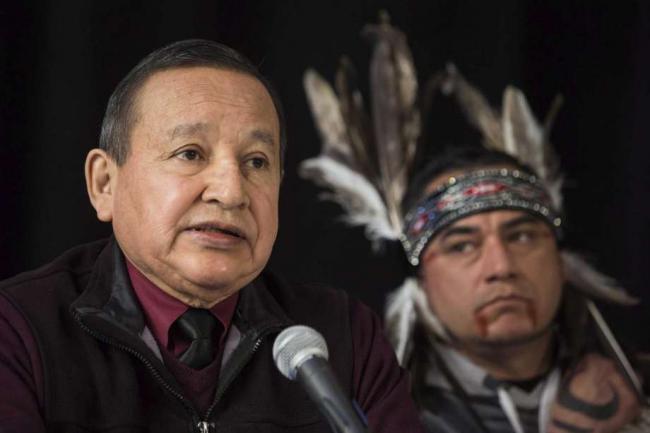Articles Menu

Shareholders at Kinder Morgan’s annual general meeting passed resolutions compelling the company to account for the risk that climate change poses to its business.
For us, climate risk isn't about profit margins or stranded assets. While fossil fuel companies manage risk through calculus, we fight it head on. Resistance from First Nations has bogged down construction of the Kinder Morgan pipeline in legal and logistical battles, and we attended the Kinder Morgan and Enbridge general meetings last week to deliver a message: These companies will continue to face Indigenous-led pushback, which is supported by court rulings reinforcing Indigenous Title and Rights. These companies should include our resolve and legal victories against their pipelines in their risk assessment.
The Trans Mountain Expansion and Line 3 projects are the latest attempts to build new pipelines for the massive Canadian Tar Sands industry and the tar-like bitumen it produces. Previous expansions of this sector have accounted for nearly half the rise in Canada’s greenhouse gas emissions since 1990. New pipelines would mean Canada will not meet its climate commitments.
New tar sands pipelines have been met by insurmountable resistance, including the 10-year-long and counting resistance to TransCanada’s Keystone XL pipeline. Indigenous-led movements stopped two other Canadian tar sands pipelines: TransCanada’s Energy East to Canada’s East Coast and Enbridge’s Northern Gateway to its West Coast.
Trans Mountain Expansion and Line 3 can expect the same fate.
The Trans Mountain Expansion would transport an extra 590,000 barrels per day of bitumen, diluted with toxic chemicals, to the western coast of British Columbia, increasing tanker traffic seven-fold. The terminus point is metro-Vancouver where approximately 2.4 million people would be impacted.
And with its Line 3 project, Canadian company Enbridge is looking to abandon an existing pipeline with a capacity of 390,000 barrels per day to build a new pipeline carrying up to 915,000 barrels of toxic diluted bitumen each day along a new route through the heart of Minnesota's lake country. The sacred wild rice beds of Ojibwe Tribes would be right along its path.
Both pipelines ignited furious opposition. Resistance is particularly fierce in British Columbia and Minnesota, all in defense of the water, the climate and Indigenous rights. A total of 150 Indigenous Nations along the proposed pipeline routes and beyond signed the Treaty Alliance Against Tar Sands Expansion and pledged to ensure tar sands oil remains in the ground.
TheTrans Mountain Expansion and Line 3 opposition movements, spearheaded by Indigenous women, have gained widespread and diverse support.
The government of British Columbia, the governor of Washington State, and the city of Vancouver are aligned against the Trans Mountain Expansion. More than 20,000 Coast Protectors have pledged to do whatever it takes to stop the project. Since early March, some 200 people, young and old, have been arrested for blocking the gates of Kinder Morgan, including two federally elected politicians. Sixteen legal challenges to the project remain outstanding.
Under the pressure, Kinder Morgan considered abandoning the project by the end of this month. Prime Minister Justin Trudeau is now looking to bail out the company with billions in financial support, putting a lie to any claim he might have to being a climate leader or defender of Indigenous rights.
Meanwhile, Enbridge, faced with opposition from Tribes in Minnesota, and a Minnesota state administration that has agreed the project is unnecessary, is experiencing obstacles of its own.
In April, a judge recommended that instead of impacting a new area, Enbridge should dig up its existing pipeline and put Line 3 in its place. That recommendation leaves Enbridge with nowhere to go, because the Leech Lake and Fond du Lac Tribes, whose reservations are crossed by the old line, have objected to the new construction as a violation of their Tribal sovereignty.
Shortly thereafter, the Wisconsin refinery that processes Enbridge’s tar sands suffered a series of massive explosions, resulting in hospitalizations, a miles-wide evacuation, and a carcinogenic smoke plume.
Where there are pipelines, there is intolerable risk.
We laid out the facts for Kinder Morgan shareholders in Houston and Enbridge shareholders in Calgary, so there can be no question in their minds that these pipelines will not be built.
Phillip is the president of the Union of British Columbia Chiefs. Houska is a member of the Couchiching First Nation and National campaign director for Honor the Earth.
[Top photo: The Grand Chief of the Union of British Columbia Indian Chiefs, Stewart Phillip, gives a news conference with indigenous leaders and politicians opposed to the expansion of the Trans Mountain oil pipeline in Vancouver, Canada on April 16. 2018. Behind is William George, a member of the Tsleil-Waututh First Nation and a guardian at the watch house near Kinder Morgan Inc. Burnaby oil facility.Photo: Darryl Dyck, SUB / Associated Press]